当前位置:网站首页>[SOC FPGA] peripheral PIO button lights up
[SOC FPGA] peripheral PIO button lights up
2022-07-07 06:15:00 【EPCCcc】
List of articles
One 、 Preparation
SoC Study — Realization hello FPGA Print
Prepare the hardware that should be prepared
Two 、 add to PIO peripherals
One 、 Gold reference project
1. Open the gold reference project 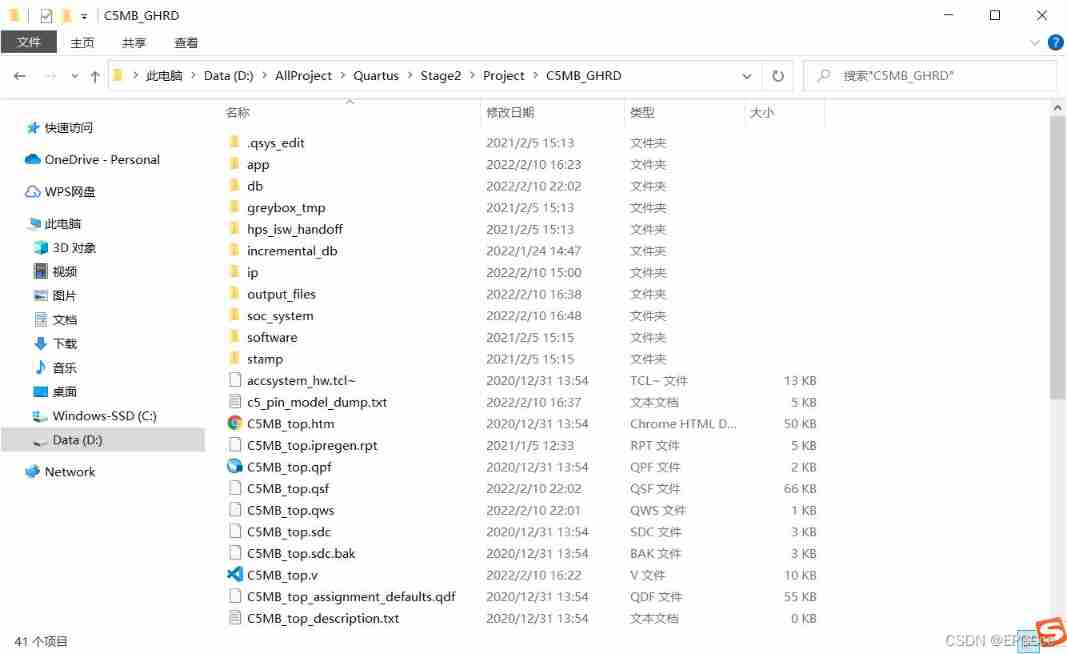
2. open Platform Designer
3. Open the corresponding qsys file 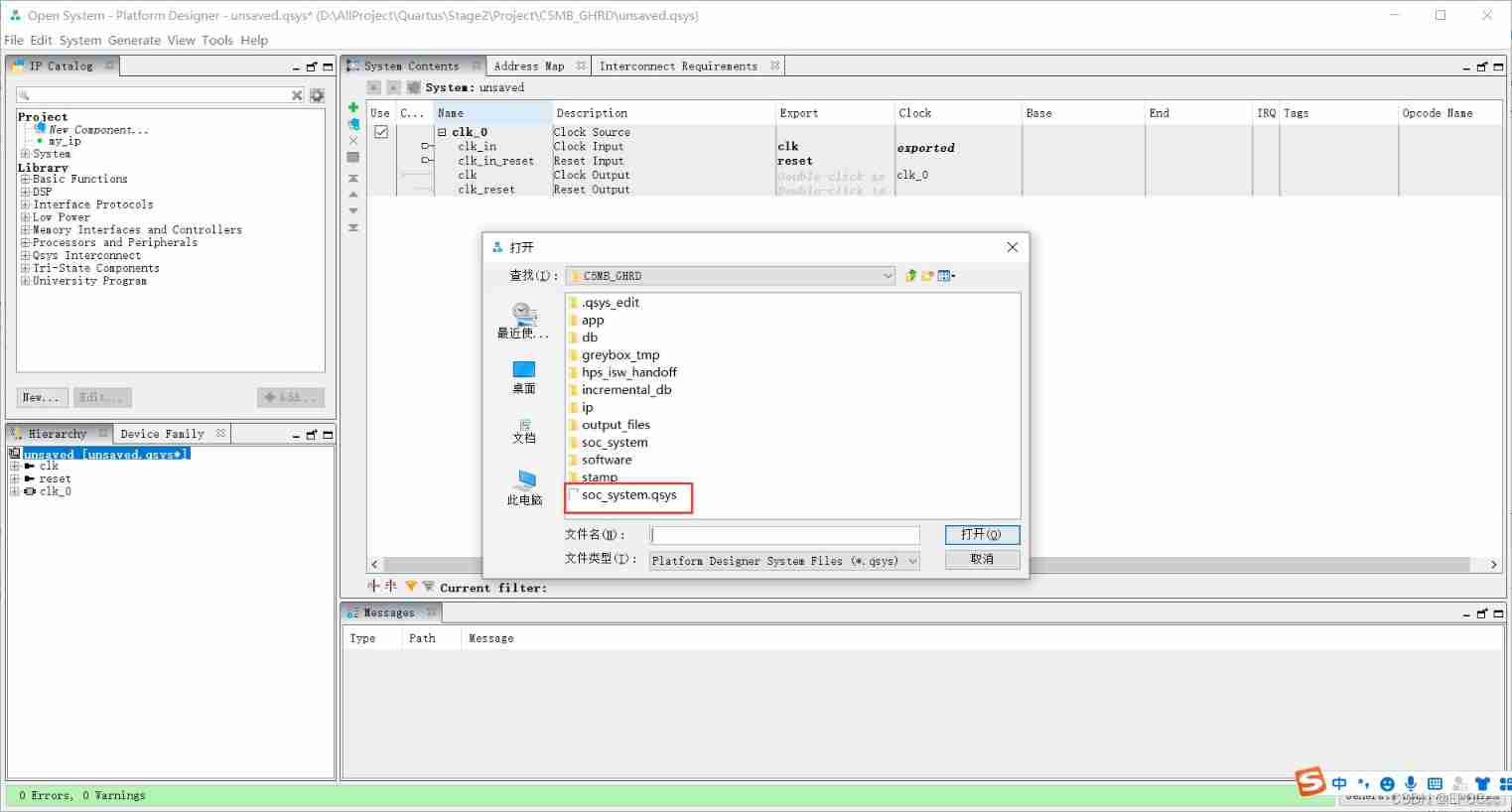
4. add to PIO_LED and PIO_KEY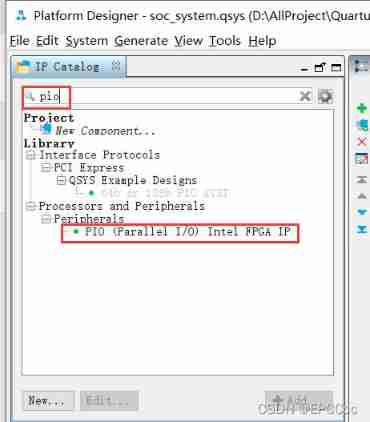
| name | A wide | Input and output |
|---|---|---|
| PIO_LED | 4 A wide | output |
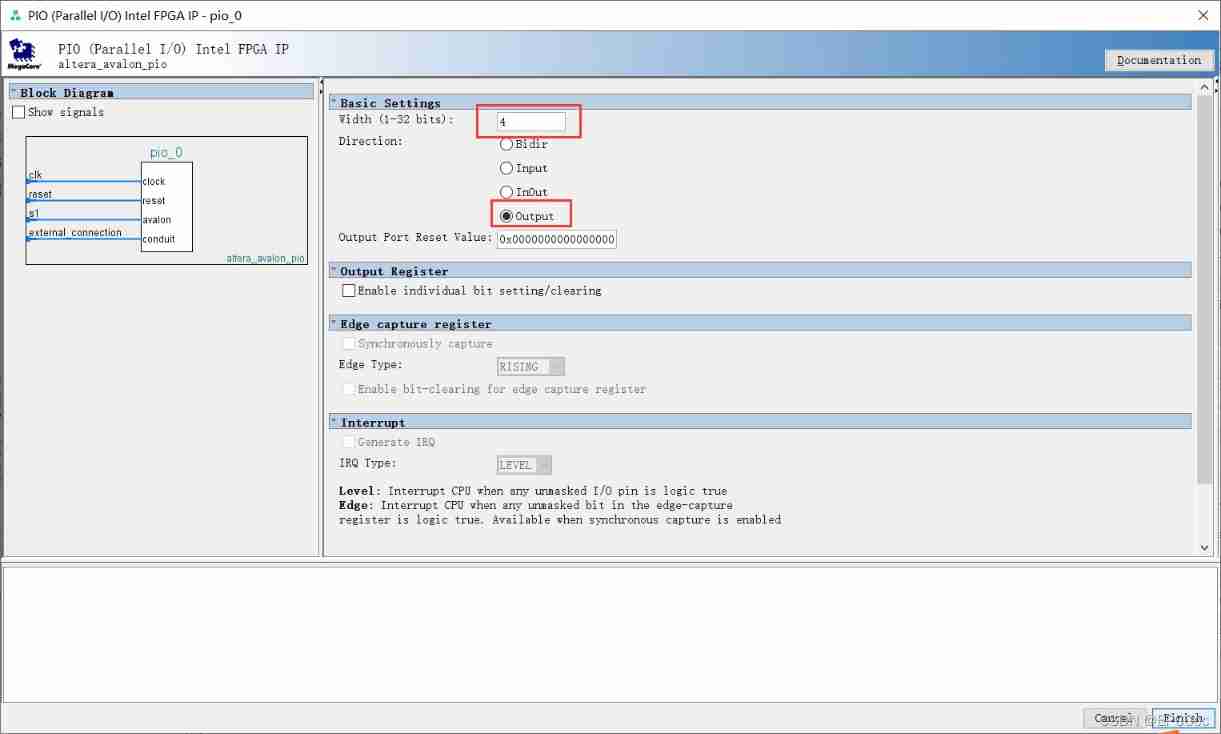
| name | A wide | Input and output |
|---|---|---|
| PIO_KEY | 2 A wide | input |
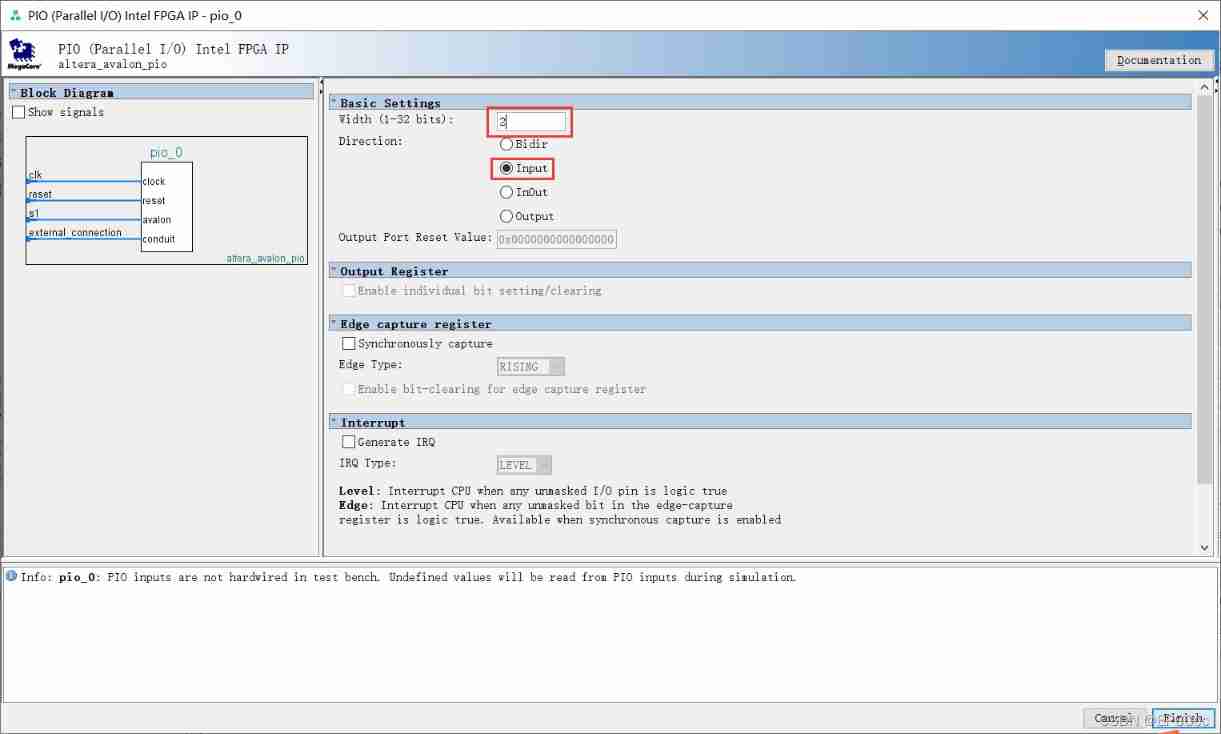
Add to soc system in 
Two 、 To configure PIO peripherals
attachment , double-click , Reset address 
Wait until there is no error Green is enough 
3、 ... and 、Generation Generate
1.Generate HDL Generate HDL Language 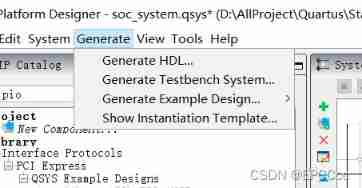
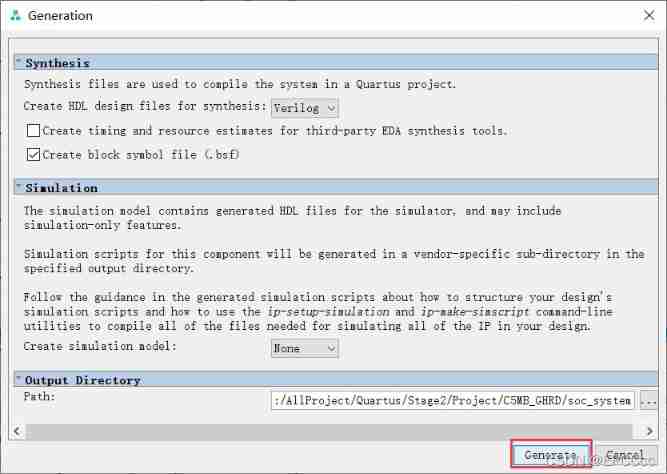
2.Show Instantiation Template Generate instantiated templates 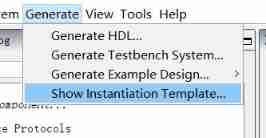
Copy the added peripheral instantiation template 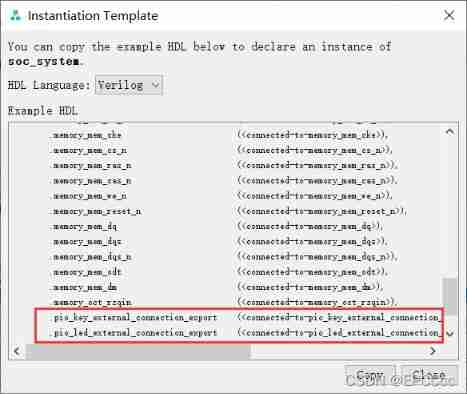
3.Finish end Platform Designer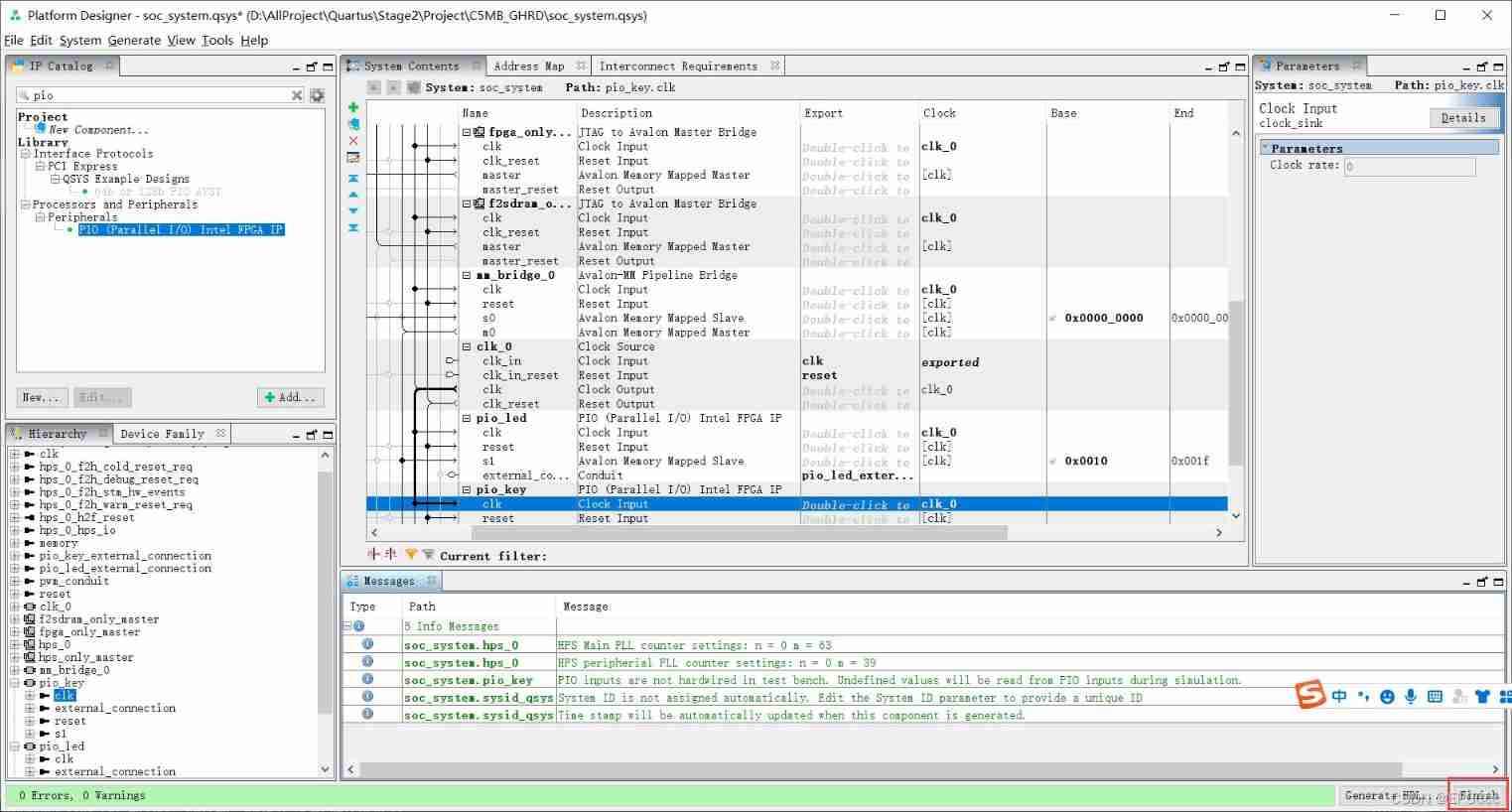
Four 、 Gold reference engineering code modification
1. Add peripheral ports
output [ 3: 0] LED,
input [ 1: 0] KEY
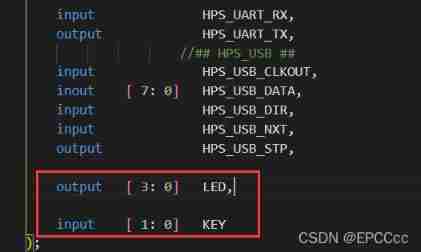
// pio_led
.pio_led_external_connection_export (LED), // pio_led_external_connection.export
// pio_key
.pio_key_external_connection_export (KEY) // pio_key_external_connection.export
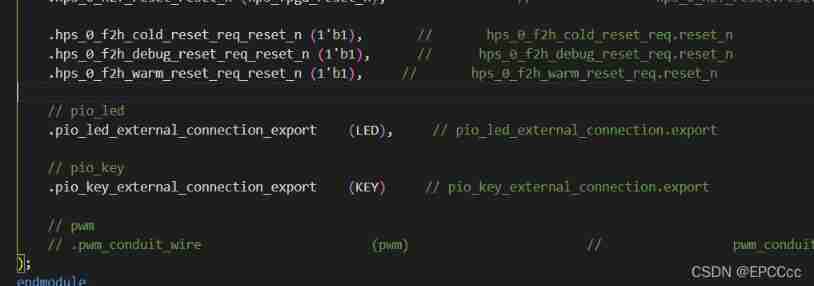
Complete code
module C5MB_top(
/ FPGA /
input FPGA_CLK1_50,
/ HPS /
output [14: 0] HPS_DDR3_ADDR,
output [ 2: 0] HPS_DDR3_BA,
output HPS_DDR3_CAS_n,
output [ 0: 0] HPS_DDR3_CKE,
output HPS_DDR3_CK_n,
output HPS_DDR3_CK_p,
output [ 0: 0] HPS_DDR3_CS_n,
output [ 3: 0] HPS_DDR3_DM,
inout [31: 0] HPS_DDR3_DQ,
inout [ 3: 0] HPS_DDR3_DQS_n,
inout [ 3: 0] HPS_DDR3_DQS_p,
output [ 0: 0] HPS_DDR3_ODT,
output HPS_DDR3_RAS_n,
output HPS_DDR3_RESET_n,
input HPS_DDR3_RZQ,
output HPS_DDR3_WE_n,
output HPS_ENET_GTX_CLK,
inout HPS_ENET_INT_n, //hps_gpio_GPIO35
output HPS_ENET_MDC,
inout HPS_ENET_MDIO,
input HPS_ENET_RX_CLK,
input [ 3: 0] HPS_ENET_RX_DATA,
input HPS_ENET_RX_DV,
output [ 3: 0] HPS_ENET_TX_DATA,
output HPS_ENET_TX_EN,
inout HPS_EMMC_SEL, //hps_io_gpio_inst_GPIO44
output HPS_SDMMC_CLK,
inout HPS_SDMMC_CMD,
inout [ 7: 0] HPS_SDMMC_DATA,
output HPS_EMMC_RST_n,
input HPS_UART_RX,
output HPS_UART_TX,
//## HPS_USB ##
input HPS_USB_CLKOUT,
inout [ 7: 0] HPS_USB_DATA,
input HPS_USB_DIR,
input HPS_USB_NXT,
output HPS_USB_STP,
output [ 3: 0] LED,
input [ 1: 0] KEY
);
//=======================================================
// REG/WIRE declarations
//=======================================================
wire hps_fpga_reset_n;
wire fpga_clk_50;
wire fpga_clk_100;
// wire pwm;
// assign LED = {4{pwm}};
pll pll_inst (
.refclk (FPGA_CLK1_50), // refclk.clk
.rst (~hps_fpga_reset_n), // reset.reset
.outclk_0 (fpga_clk_50), // outclk0.clk
.outclk_1 (fpga_clk_100)
);
//=======================================================
// Structural coding
//=======================================================
soc_system u0 (
.clk_clk (fpga_clk_50), // clk.clk
.reset_reset_n (hps_fpga_reset_n), // reset.reset_n
//HPS ddr3
.memory_mem_a (HPS_DDR3_ADDR), // memory.mem_a
.memory_mem_ba (HPS_DDR3_BA), // .mem_ba
.memory_mem_ck (HPS_DDR3_CK_p), // .mem_ck
.memory_mem_ck_n (HPS_DDR3_CK_n), // .mem_ck_n
.memory_mem_cke (HPS_DDR3_CKE), // .mem_cke
.memory_mem_cs_n (HPS_DDR3_CS_n), // .mem_cs_n
.memory_mem_ras_n (HPS_DDR3_RAS_n), // .mem_ras_n
.memory_mem_cas_n (HPS_DDR3_CAS_n), // .mem_cas_n
.memory_mem_we_n (HPS_DDR3_WE_n), // .mem_we_n
.memory_mem_reset_n (HPS_DDR3_RESET_n), // .mem_reset_n
.memory_mem_dq (HPS_DDR3_DQ), // .mem_dq
.memory_mem_dqs (HPS_DDR3_DQS_p), // .mem_dqs
.memory_mem_dqs_n (HPS_DDR3_DQS_n), // .mem_dqs_n
.memory_mem_odt (HPS_DDR3_ODT), // .mem_odt
.memory_mem_dm (HPS_DDR3_DM), // .mem_dm
.memory_oct_rzqin (HPS_DDR3_RZQ), // .oct_rzqin
//HPS ethernet
.hps_0_hps_io_hps_io_emac1_inst_TX_CLK (HPS_ENET_GTX_CLK), // hps_0_hps_io.hps_io_emac1_inst_TX_CLK
.hps_0_hps_io_hps_io_emac1_inst_TXD0 (HPS_ENET_TX_DATA[0]), // .hps_io_emac1_inst_TXD0
.hps_0_hps_io_hps_io_emac1_inst_TXD1 (HPS_ENET_TX_DATA[1]), // .hps_io_emac1_inst_TXD1
.hps_0_hps_io_hps_io_emac1_inst_TXD2 (HPS_ENET_TX_DATA[2]), // .hps_io_emac1_inst_TXD2
.hps_0_hps_io_hps_io_emac1_inst_TXD3 (HPS_ENET_TX_DATA[3]), // .hps_io_emac1_inst_TXD3
.hps_0_hps_io_hps_io_emac1_inst_RXD0 (HPS_ENET_RX_DATA[0]), // .hps_io_emac1_inst_RXD0
.hps_0_hps_io_hps_io_emac1_inst_MDIO (HPS_ENET_MDIO), // .hps_io_emac1_inst_MDIO
.hps_0_hps_io_hps_io_emac1_inst_MDC (HPS_ENET_MDC), // .hps_io_emac1_inst_MDC
.hps_0_hps_io_hps_io_emac1_inst_RX_CTL (HPS_ENET_RX_DV), // .hps_io_emac1_inst_RX_CTL
.hps_0_hps_io_hps_io_emac1_inst_TX_CTL (HPS_ENET_TX_EN), // .hps_io_emac1_inst_TX_CTL
.hps_0_hps_io_hps_io_emac1_inst_RX_CLK (HPS_ENET_RX_CLK), // .hps_io_emac1_inst_RX_CLK
.hps_0_hps_io_hps_io_emac1_inst_RXD1 (HPS_ENET_RX_DATA[1]), // .hps_io_emac1_inst_RXD1
.hps_0_hps_io_hps_io_emac1_inst_RXD2 (HPS_ENET_RX_DATA[2]), // .hps_io_emac1_inst_RXD2
.hps_0_hps_io_hps_io_emac1_inst_RXD3 (HPS_ENET_RX_DATA[3]), // .hps_io_emac1_inst_RXD3
//HPS SD card
.hps_0_hps_io_hps_io_sdio_inst_CMD (HPS_SDMMC_CMD), // .hps_io_sdio_inst_CMD
.hps_0_hps_io_hps_io_sdio_inst_D0 (HPS_SDMMC_DATA[0]), // .hps_io_sdio_inst_D0
.hps_0_hps_io_hps_io_sdio_inst_D1 (HPS_SDMMC_DATA[1]), // .hps_io_sdio_inst_D1
.hps_0_hps_io_hps_io_sdio_inst_CLK (HPS_SDMMC_CLK), // .hps_io_sdio_inst_CLK
.hps_0_hps_io_hps_io_sdio_inst_D2 (HPS_SDMMC_DATA[2]), // .hps_io_sdio_inst_D2
.hps_0_hps_io_hps_io_sdio_inst_D3 (HPS_SDMMC_DATA[3]), // .hps_io_sdio_inst_D3
.hps_0_hps_io_hps_io_sdio_inst_D4 (HPS_SDMMC_DATA[4]), // .hps_io_sdio_inst_D4
.hps_0_hps_io_hps_io_sdio_inst_D5 (HPS_SDMMC_DATA[5]), // .hps_io_sdio_inst_D5
.hps_0_hps_io_hps_io_sdio_inst_D6 (HPS_SDMMC_DATA[6]), // .hps_io_sdio_inst_D6
.hps_0_hps_io_hps_io_sdio_inst_D7 (HPS_SDMMC_DATA[7]), // .hps_io_sdio_inst_D7
.hps_0_hps_io_hps_io_sdio_inst_PWREN (HPS_EMMC_RST_n), // .hps_io_sdio_inst_PWREN
//HPS USB
.hps_0_hps_io_hps_io_usb1_inst_D0 (HPS_USB_DATA[0]), // .hps_io_usb1_inst_D0
.hps_0_hps_io_hps_io_usb1_inst_D1 (HPS_USB_DATA[1]), // .hps_io_usb1_inst_D1
.hps_0_hps_io_hps_io_usb1_inst_D2 (HPS_USB_DATA[2]), // .hps_io_usb1_inst_D2
.hps_0_hps_io_hps_io_usb1_inst_D3 (HPS_USB_DATA[3]), // .hps_io_usb1_inst_D3
.hps_0_hps_io_hps_io_usb1_inst_D4 (HPS_USB_DATA[4]), // .hps_io_usb1_inst_D4
.hps_0_hps_io_hps_io_usb1_inst_D5 (HPS_USB_DATA[5]), // .hps_io_usb1_inst_D5
.hps_0_hps_io_hps_io_usb1_inst_D6 (HPS_USB_DATA[6]), // .hps_io_usb1_inst_D6
.hps_0_hps_io_hps_io_usb1_inst_D7 (HPS_USB_DATA[7]), // .hps_io_usb1_inst_D7
.hps_0_hps_io_hps_io_usb1_inst_CLK (HPS_USB_CLKOUT), // .hps_io_usb1_inst_CLK
.hps_0_hps_io_hps_io_usb1_inst_STP (HPS_USB_STP), // .hps_io_usb1_inst_STP
.hps_0_hps_io_hps_io_usb1_inst_DIR (HPS_USB_DIR), // .hps_io_usb1_inst_DIR
.hps_0_hps_io_hps_io_usb1_inst_NXT (HPS_USB_NXT), // .hps_io_usb1_inst_NXT
//HPS UART
.hps_0_hps_io_hps_io_uart0_inst_RX (HPS_UART_RX), // .hps_io_uart0_inst_RX
.hps_0_hps_io_hps_io_uart0_inst_TX (HPS_UART_TX), // .hps_io_uart0_inst_TX
.hps_0_hps_io_hps_io_gpio_inst_GPIO35 (HPS_ENET_INT_n), // .hps_io_gpio_inst_GPIO35
.hps_0_hps_io_hps_io_gpio_inst_GPIO44 (HPS_EMMC_SEL), // .hps_io_gpio_inst_GPIO44
.hps_0_h2f_reset_reset_n (hps_fpga_reset_n), // hps_0_h2f_reset.reset_n
.hps_0_f2h_cold_reset_req_reset_n (1'b1), // hps_0_f2h_cold_reset_req.reset_n
.hps_0_f2h_debug_reset_req_reset_n (1'b1), // hps_0_f2h_debug_reset_req.reset_n
.hps_0_f2h_warm_reset_req_reset_n (1'b1), // hps_0_f2h_warm_reset_req.reset_n
// pio_led
.pio_led_external_connection_export (LED), // pio_led_external_connection.export
// pio_key
.pio_key_external_connection_export (KEY) // pio_key_external_connection.export
// pwm
// .pwm_conduit_wire (pwm) // pwm_conduit.wire
);
endmodule
5、 ... and 、 Compile the golden project
General computers need 6-8 minute
3、 ... and 、 Generate the corresponding file , Transfer to sd Carnet
One 、dtb Device tree file
Enter the directory of gold reference project
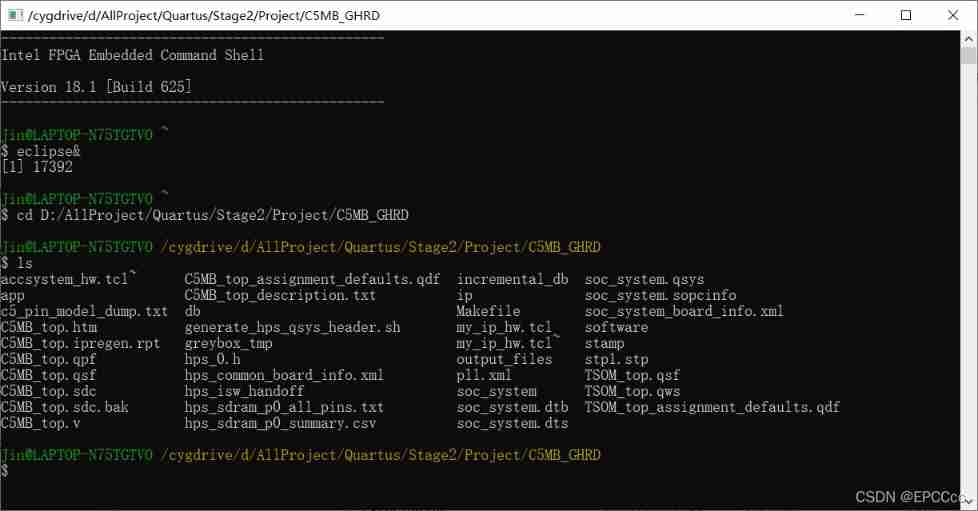
Generate .dtb file
make dtb

If I have generated peripherals, I don't need to generate them , If you need to wait a few minutes for the first time
Two 、rbf file
Enter into output_files/ Under the table of contents
function sof_to_rbf.bat Script files
cd output_files/
./sof_to_rbf.bat
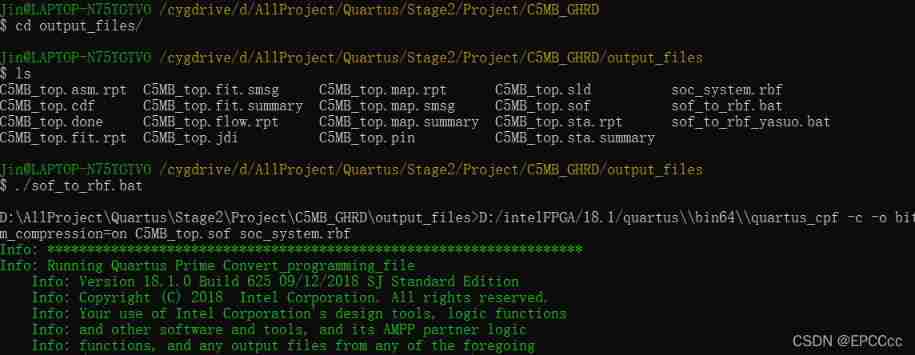
3、 ... and 、 Replace sd Inside the card dtb and rbf file
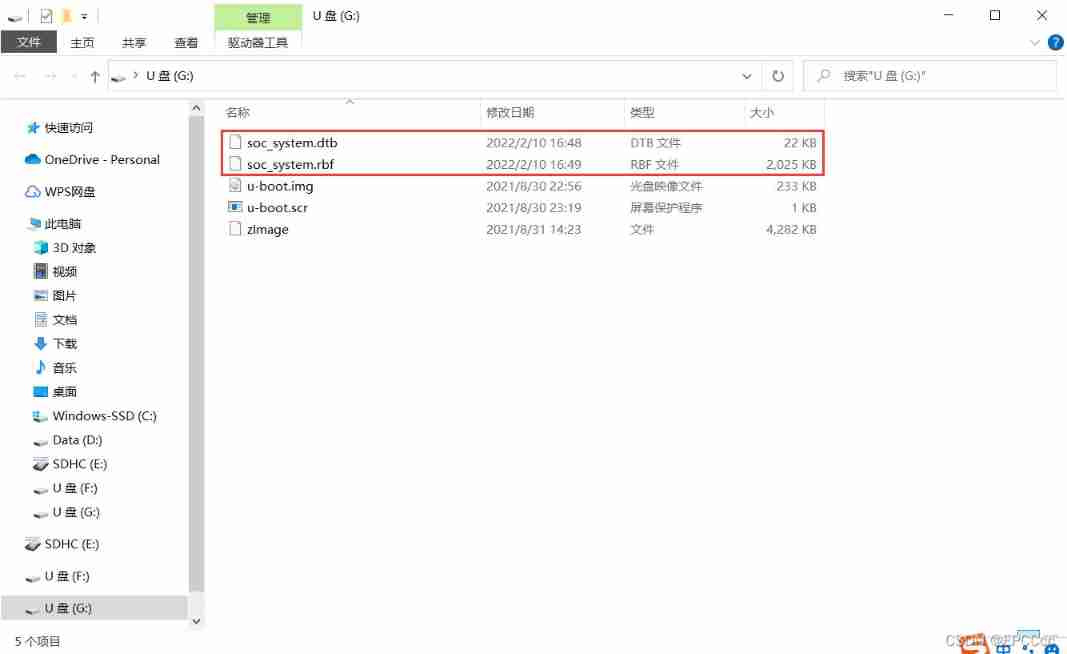
Four 、 Generate hps_0.h
./generate_hps_qsys_header.sh
This hps_0.h For the follow-up C What language needs 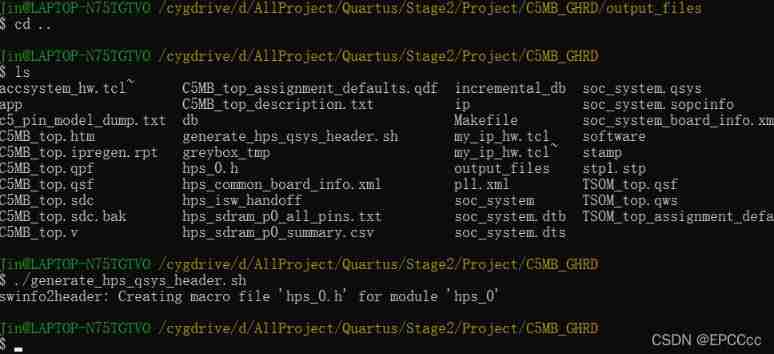
3、 ... and 、C Language implementation
One 、 Create and configure projects
1. open SoC EDS Command Shell
2. open eclipse
eclipse&

3. New A new C Project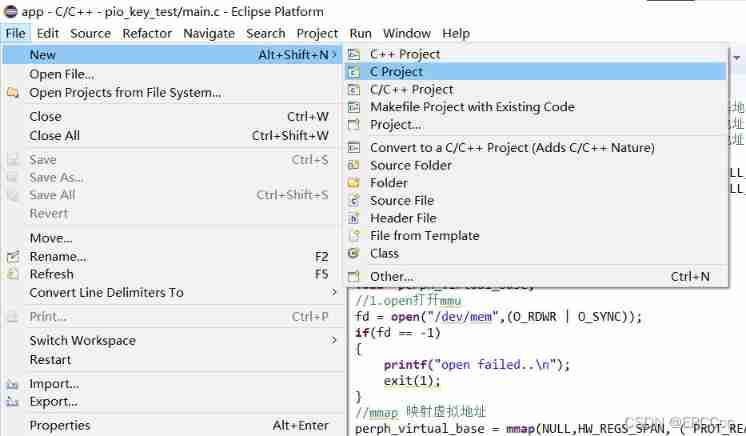
4. choice GCC compile 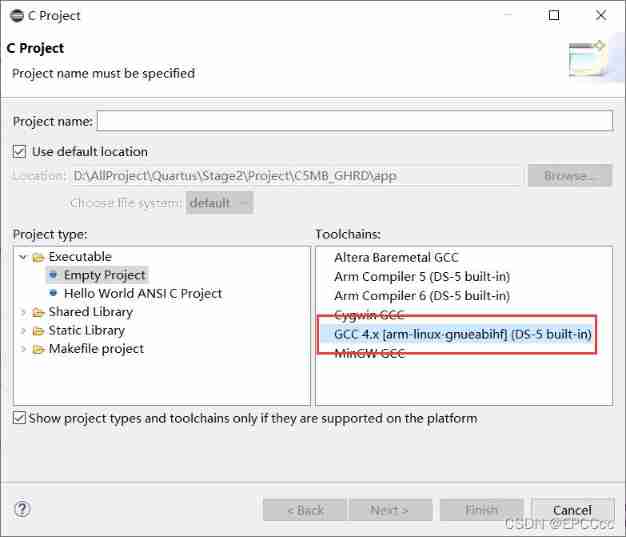
5. Right click the created new project property 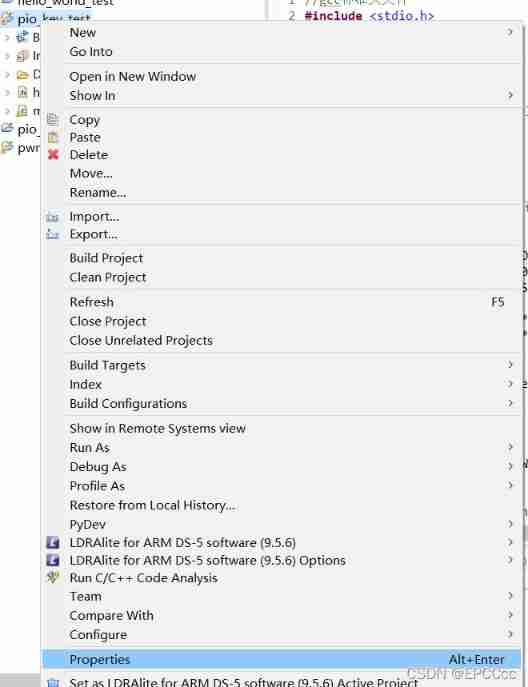
6. Add two additional libraries
D:\intelFPGA\18.1\embedded\ip\altera\hps\altera_hps\hwlib\include\soc_cv_av
D:\intelFPGA\18.1\embedded\ip\altera\hps\altera_hps\hwlib\include
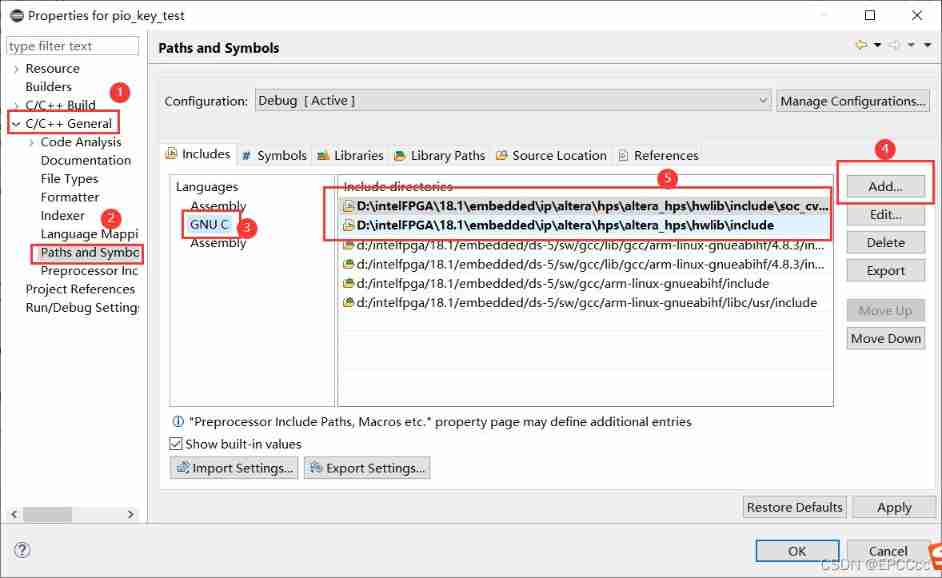
7. The gold project hps_0.h Put the file into the project 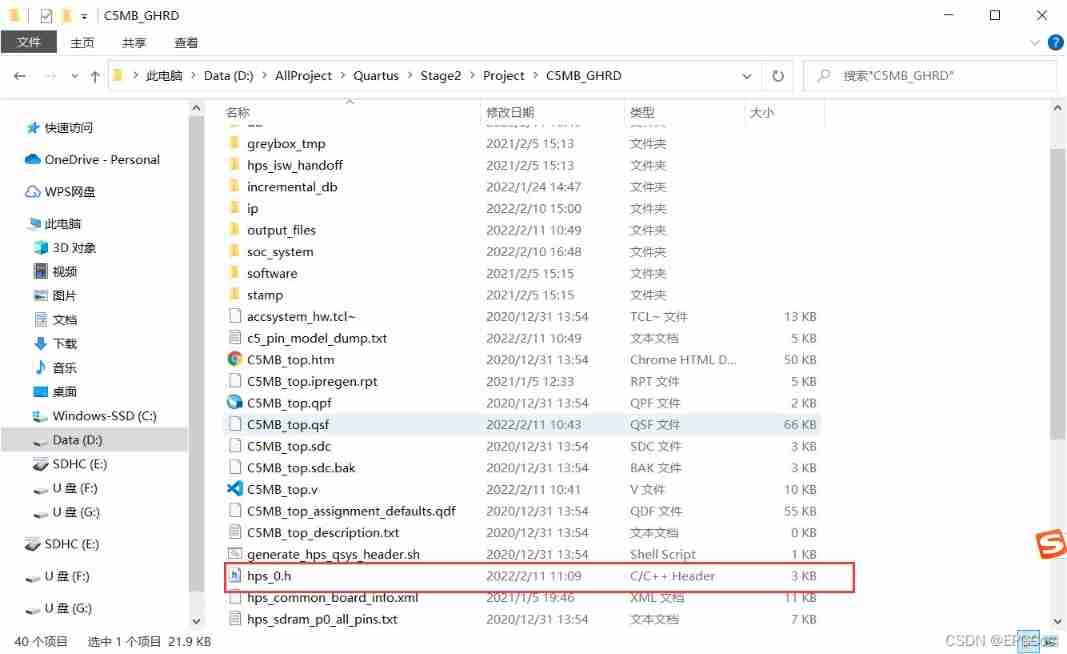
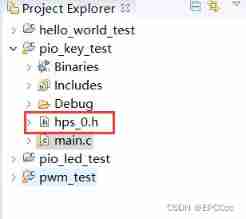
Two 、C Language implementation key lighting
1.New A new C file main.c
2. To write C The language code
//gcc Standard header file
#include <stdio.h>
#include <unistd.h>
#include <fcntl.h>
#include <sys/mman.h>
//HPS The underlying definition header file provided by the manufacturer
#define soc_cv_av // Development platform Cyclone V series
#include "hwlib.h"
#include "socal/socal.h"
#include "socal/hps.h"
// Specific to the user HPS Hardware description header file related to the application system
#include "hps_0.h"
#define HW_REGS_BASE (ALT_STM_OFST) //HPS Peripheral address segment base address
#define HW_REGS_SPAN (0x04000000) //HPS Peripheral address segment address space 64MB size
#define HW_REGS_MASK (HW_REGS_SPAN - 1) //HPS Peripheral address field address mask
static volatile unsigned long *led_pio_virtual_base = NULL;
static volatile unsigned long *key_pio_virtual_base = NULL;
//fpga initialization
int fpga_init(int *virtual_base)
{
int fd;
void *perph_virtual_base;
//1.open open mmu
fd = open("/dev/mem",(O_RDWR | O_SYNC));
if(fd == -1)
{
printf("open failed..\n");
exit(1);
}
//mmap Mapping virtual addresses
perph_virtual_base = mmap(NULL,HW_REGS_SPAN, ( PROT_READ | PROT_WRITE ),MAP_SHARED,fd,HW_REGS_BASE);
if(perph_virtual_base == MAP_SHARED)
{
printf("mmap() is failed..\n");
return 1;
}
// Interface
led_pio_virtual_base = perph_virtual_base + ((unsigned long)(ALT_LWFPGASLVS_OFST + PIO_LED_BASE) & (unsigned long)(HW_REGS_MASK));
key_pio_virtual_base = perph_virtual_base + ((unsigned long)(ALT_LWFPGASLVS_OFST + PIO_KEY_BASE) & (unsigned long)(HW_REGS_MASK));
// Save virtual address
*virtual_base = perph_virtual_base;
return fd;
}
int main()
{
int virtual_base;
int fd;
fd = fpga_init(&virtual_base);
unsigned int data;
while(1)
{
// data = ~(*(key_pio_virtual_base + 0));
// *(led_pio_virtual_base + 0) = ~(*(key_pio_virtual_base + 0));
// *(led_pio_virtual_base + 0) = data;
if(*(key_pio_virtual_base + 0) == 0x01)
{
*(led_pio_virtual_base + 0) = 0xf;
}
else if(*(key_pio_virtual_base + 0) == 0x02)
{
*(led_pio_virtual_base + 0) = 0x0;
}
}
if(munmap(virtual_base,HW_REGS_SPAN) != 0)
{
printf("munmap() is failed..\n");
close(fd);
return 1;
}
close(fd);
return 0;
}
After saving and compiling, a binary file will be generated 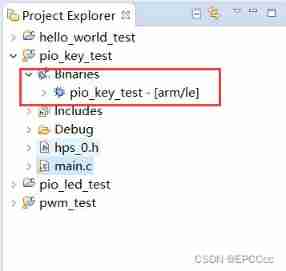
Four 、 Connect SoC FPGA
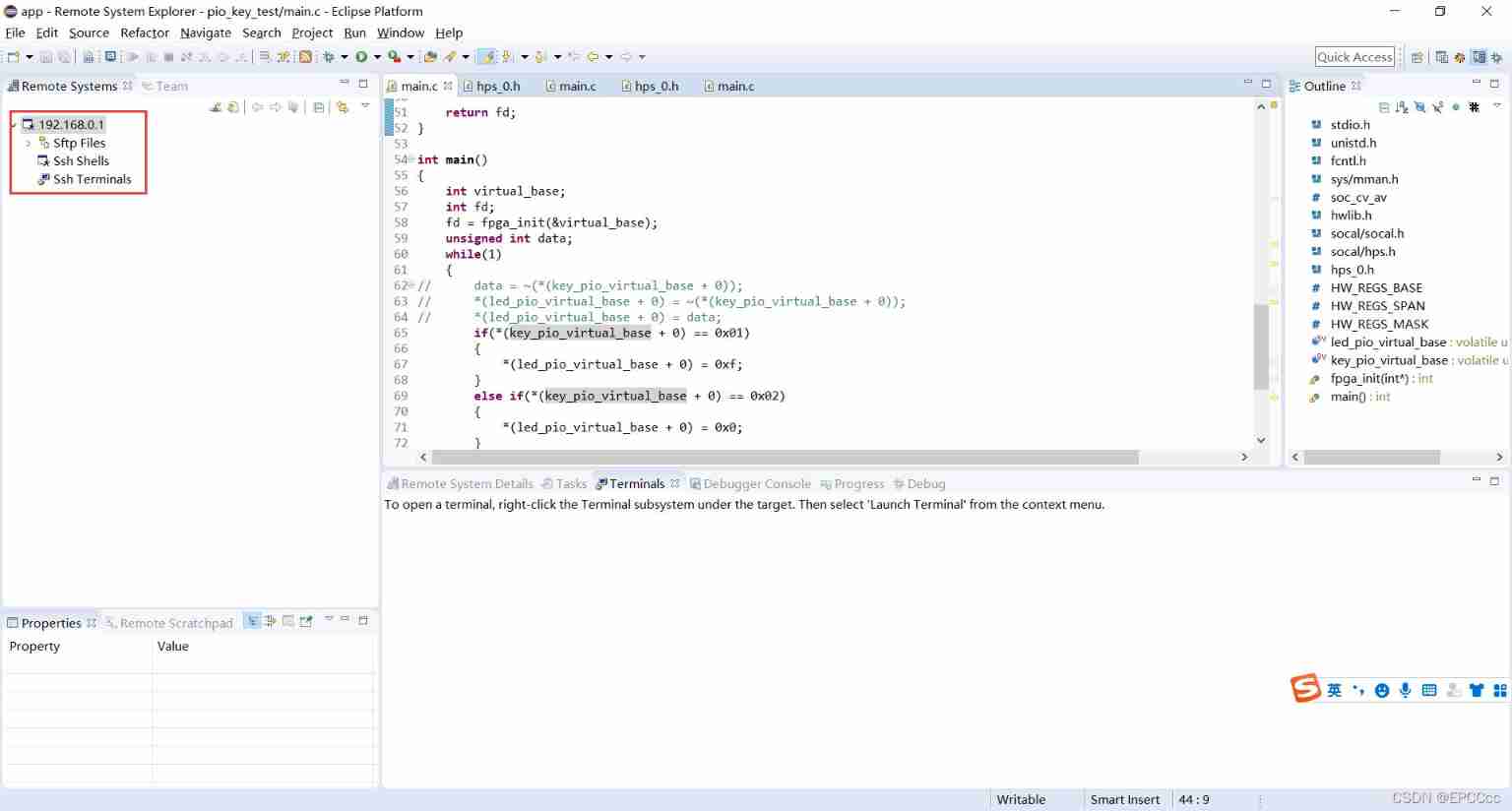
take C Put the binary file of language into opt In the file 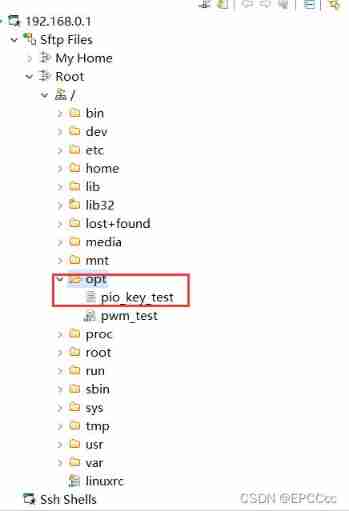
Permission is required to run the executable
cd opt/
chmod 777 pio_key_test
./pio_key_test
If the color turns green, you have permission 
5、 ... and 、 Execution effect
It's not convenient to shoot here , It's the effect of pressing the button to light the light
6、 ... and 、 summary
SoC To achieve the function , Is to add ip peripherals , Calculate the virtual mapping address of the peripheral , And then through C Language to assign a value to the base address , Finally, connect to the board to execute , The basic step is to know , But some C I don't understand the content of the language .
边栏推荐
- [Shell]常用shell命令及测试判断语句总结
- yarn入门(一篇就够了)
- 当我们谈论不可变基础设施时,我们在谈论什么
- VScode进行代码补全
- vim映射大K
- Bbox regression loss function in target detection -l2, smooth L1, IOU, giou, Diou, ciou, focal eiou, alpha IOU, Siou
- The boss always asks me about my progress. Don't you trust me? (what do you think)
- cf:C. Column Swapping【排序 + 模拟】
- Ideas of high concurrency and high traffic seckill scheme
- C. colonne Swapping [tri + Simulation]
猜你喜欢
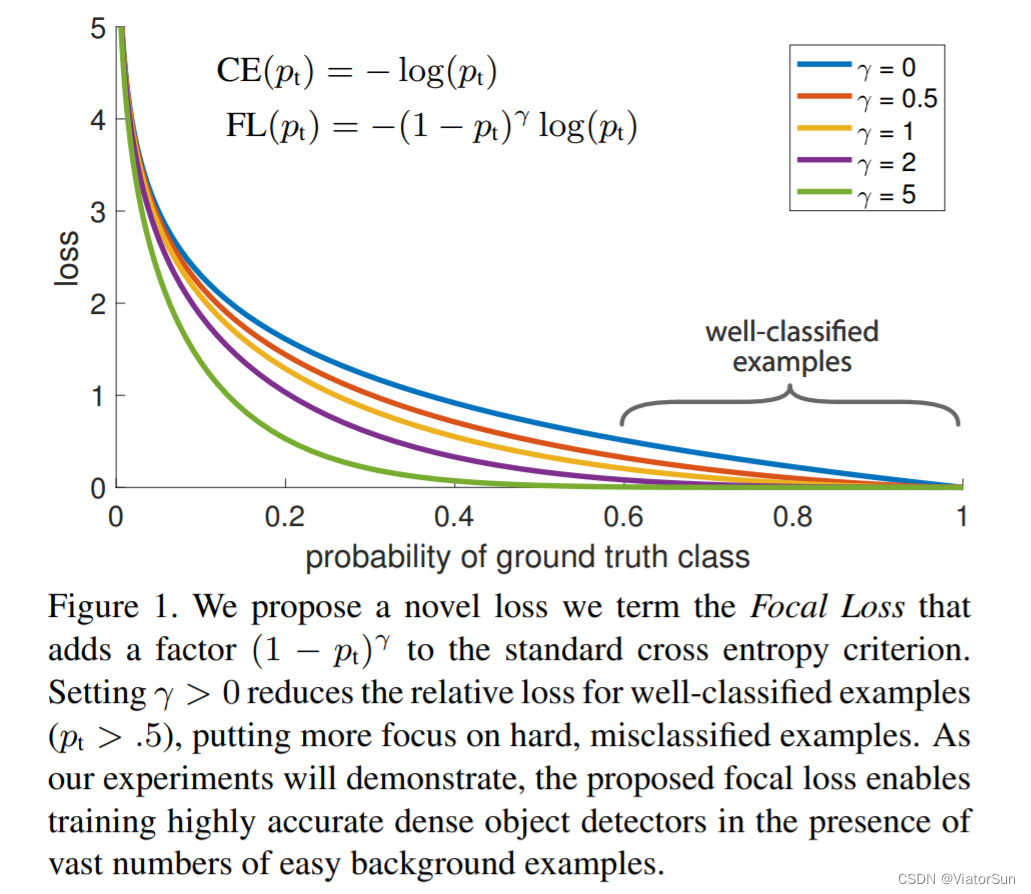
「解析」FocalLoss 解决数据不平衡问题
![[FPGA tutorial case 14] design and implementation of FIR filter based on vivado core](/img/fc/5162bbb0746f8af2d6c7d63ade571a.png)
[FPGA tutorial case 14] design and implementation of FIR filter based on vivado core
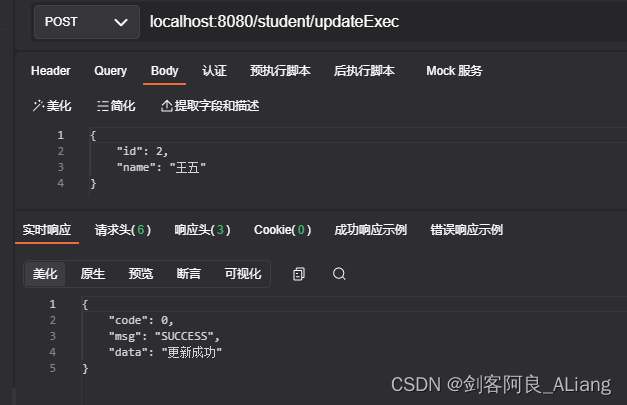
Go language learning notes - Gorm use - native SQL, named parameters, rows, tosql | web framework gin (IX)
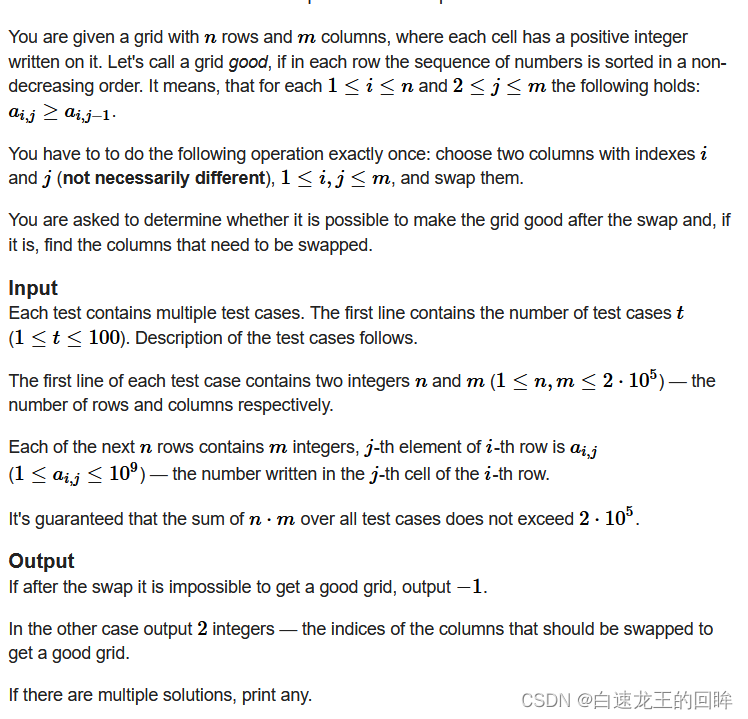
cf:C. Column Swapping【排序 + 模拟】
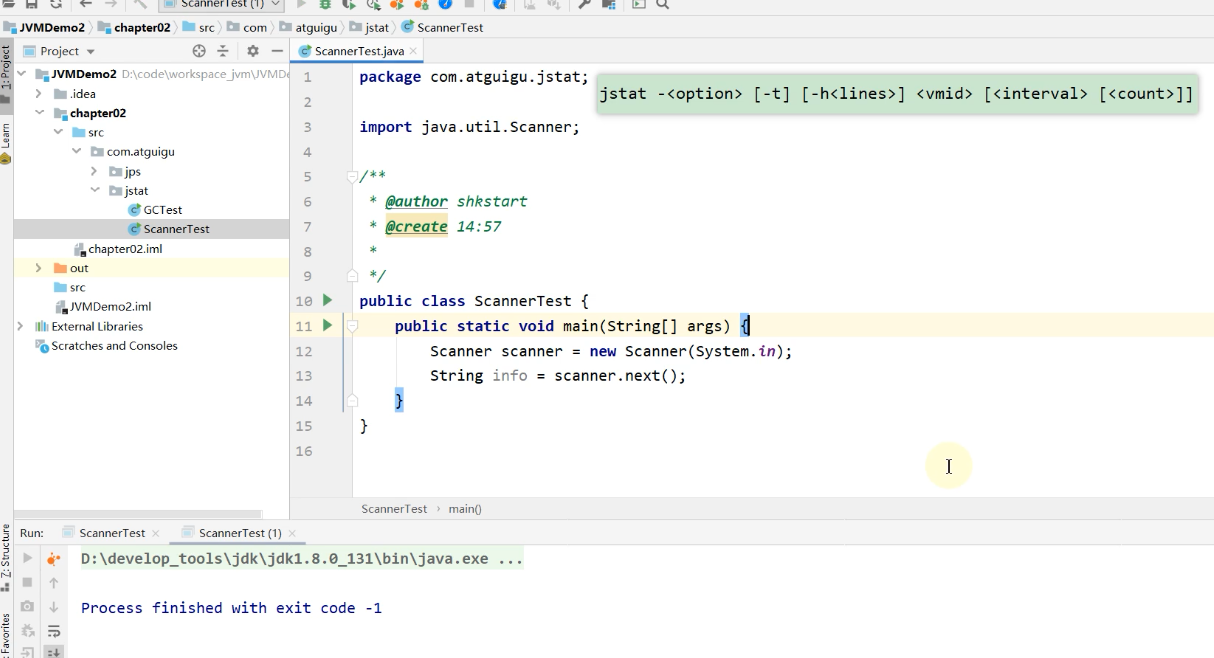
JVM命令之 jstat:查看JVM統計信息

苹果cms V10模板/MXone Pro自适应影视电影网站模板

Jstack of JVM command: print thread snapshots in JVM

软件测试知识储备:关于「登录安全」的基础知识,你了解多少?

Check point: the core element for enterprises to deploy zero trust network (ztna)
![Cf:c. column swapping [sort + simulate]](/img/0e/64d17980d3ec0051cdfb5fdb34e119.png)
Cf:c. column swapping [sort + simulate]
随机推荐
[FPGA tutorial case 13] design and implementation of CIC filter based on vivado core
Redisl garbled code and expiration time configuration
[InstallShield] Introduction
Change the original style of UI components
JVM命令之 jstat:查看JVM统计信息
Qtthread, one of many methods of QT multithreading
解决pod install报错:ffi is an incompatible architecture
Check Point:企业部署零信任网络(ZTNA)的核心要素
Senior programmers must know and master. This article explains in detail the principle of MySQL master-slave synchronization, and recommends collecting
The boss always asks me about my progress. Don't you trust me? (what do you think)
360 Zhiyu released 7.0 new products to create an exclusive "unified digital workspace" for the party, government and army, and central and state-owned enterprises
jvm命令之 jcmd:多功能命令行
Solve pod install error: FFI is an incompatible architecture
Rk3399 platform development series explanation (interruption) 13.10, workqueue work queue
Qt多线程的多种方法之一 QThread
How to set up in touch designer 2022 to solve the problem that leap motion is not recognized?
C语言整理(待更新)
Mac version PHP installed Xdebug environment (M1 version)
Swagger3 configuration
10W word segmentation searches per second, the product manager raised another demand!!! (Collection)